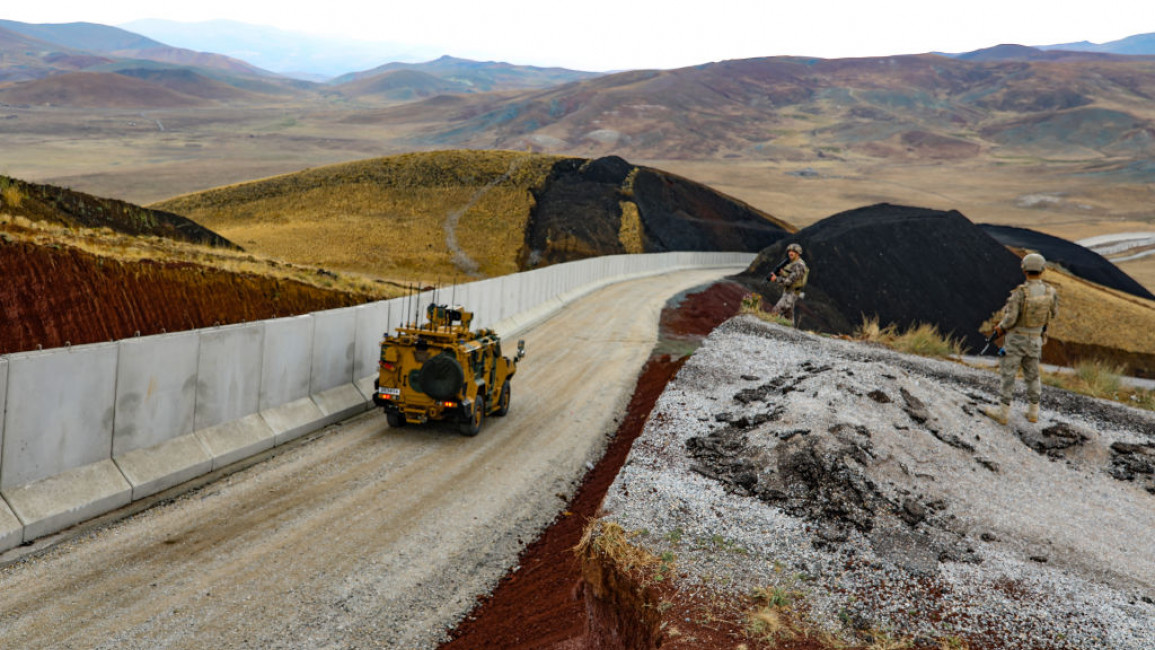Turkey bolsters border wall with Iran amid fears of migrant wave from Afghanistan
Underwear, an empty bottle and fresh footprints betray signs of migrants sneaking around a new wall along the Turkey-Iran border and stirring worries in Europe following the Taliban's rise in Afghanistan.
The Afghans who make it this far spend days hiding from law enforcement and nights devising ways to get to big cities such as Izmir and Istanbul before finding smugglers to take them to Europe.
"I am coming from Kandahar. I have been on the road for 25 days," said Mohammed Arif, 18, who paid $700 (600 euros) to a Turkish smuggler but was dropped off long before he could reach Istanbul.
"It is dangerous to return. Where would we go?" he asked in Dari.
The Taliban's lightning offensive has revived memories in Europe of a 2015-16 refugee crisis that Turkey helped stop by sheltering millions of people in exchange for billions of dollars in aid.
The UN has recorded no "large-scale" moves across Afghan borders in response to the US troop withdrawal and the fundamentalist regime's return to power after 20 years of war.
And EU officials say the number of crossings into Europe by Afghans dropped by roughly 40 percent in the first six months of the year because of coronavirus-related border restrictions.
But fears of such a “large-scale” movement have kept Turkey on high alert in the eastern province of Van, which borders Iran.
“Since July 13, with reinforcements deployed from other provinces, security measures have been kept at a high level at the borderline,” Mehmet Emin Bilmez, the governor of the eastern Van province, told reporters.
“In addition to the wall, the law enforcement officers keep the border under control day and night,” Bilmez added.
“We are resolutely implementing the measures we have taken to prevent irregular migration flows, together with 54 elements comprising security guards, commandos, and internal security teams just behind the border units,” Col. Osman Delen, Deputy Commander of the Provincial Gendarmerie, told reporters.
Sensing the nation's mood, Turkish President Recep Tayyip Erdogan has vowed to put a "complete stop" to irregular migrant crossings.
A 243-kilometre (151-mile) concrete wall, topped with barbed wire and surrounded by trenches, is being erected along its 534-kilometre frontier with Iran.
Turkish officials told AFP that 156 kilometres have already been built, greatly limiting migrant flows.
But security officials say in private that tens of thousands of Afghans are believed to be massing on the Iranian side.
Arif and dozens of other Afghans AFP encountered -- all of them men -- crossed a borderless section and then found temporary shelter behind some railway tracks in Tatvan, on the western shores of Lake Van.
"Afghanistan is finished," said Nakivillah Ikbali, 19, whose 15-day journey from Mazar-i-Sharif in Afghanistan took him to Pakistan and Iran.
"It will be even worse now. I am 19. I would love to go to school or mosque, but my life is gone."
Others like Arman Ahmadi, 17, are making their second attempt at escape.
He was deported last year after being caught in Istanbul, where he worked illegally as a barber, and says he would love to settle in Turkey for good.
"Your state (Turkey) tells me to go to Afghanistan, but there's a war," he said. "I don't want to go to Europe. If Turkey provides me shelter, I want to stay.
Unstable Iran
Until 2013, Turkey resettled Afghans in third countries, mostly in Europe and refugee-friendly places such as Canada.
That practise ended when EU member states declared Afghanistan safe because of the NATO presence.
Official data shows 120,000 Afghan refugees in Turkey, and up to 300,000 undocumented Afghan migrants.
Those numbers are dwarfed by the 3.6 million refugees from neighbouring Syria.
Metin Corabatir, former Turkey spokesman for the UN refugee agency UNHCR, said Afghanistan's western neighbour Iran has been able to absorb past migrant flows.
"It hosted two million Afghans during the 1979 Soviet invasion," he told AFP.
But he added that years of US-led sanctions linked to Tehran's nuclear programme have devastated Iran's economy, making the situation more volatile.
"To what extent Iran could provide protection to new arrivals, we don't know yet," Corabatir said.


![President Pezeshkian has denounced Israel's attacks on Lebanon [Getty]](/sites/default/files/styles/image_684x385/public/2173482924.jpeg?h=a5f2f23a&itok=q3evVtko)



 Follow the Middle East's top stories in English at The New Arab on Google News
Follow the Middle East's top stories in English at The New Arab on Google News


